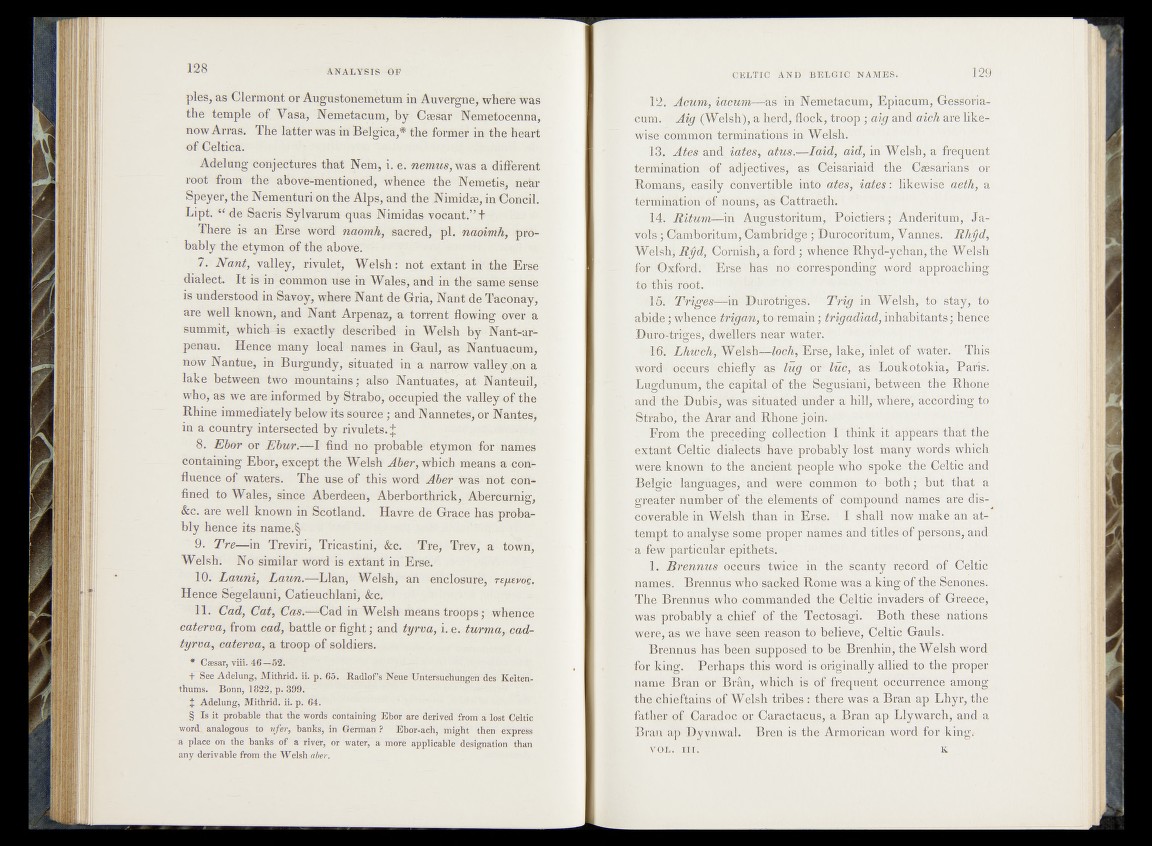
128 a n a l y s is o f
pies, as Clermont or Augustonemetum in Auvergne, where was
the temple of Vasa, Nemetacum^by Csesar Semeloeenna,
now Arras. The latter was in Belgica,* the former in the heart
of Celtica.
Adelung conjectures that Nei% i . e. nemus, was a different
root from the above-mentioned, whence the NemeMs/ nebr
Speyer, tl^Nementuri'on the Alps, and the Nimidae, in Concil.
Lipt. “ de Sacrte Sylvarum quas Nimidas v©eant.,,+
There is an Erse word naomh, sacred, pi. nadmh, probably
the etymon of the abo^e.T
7. Nant, valley, rivulet, Welsh : not extant in the Erse
diatect. It is in common use in Wales, and in the same sense
is understood’in Savoy, where Nant doGria, Nant de Täconay,
are well known, and Nant Arpenaz, a torrent flowing over a
summit, wbieh4s exactly described in? Welsh by Nant-ar-
penau. Hence many local namis in Gaul, as Nantuacum,
no w Nantue, in Burgundy, situated in 'a narrow valley «on a
lake between two mountains; also Nantuates, at Nantbuiï’,
wbo/als we are »formed by .Strähn pdeupied/the valley of the
Rhine immediately below its source; and Nannetes, or Nantes»*
in a country intersected by rivulets. J
8. Ebor or Ebur.—I find no probable etymon for names
containing Ebor, except the Welsh Aber, which means a confluence
of waters. The use of this word Aber Was not confined
to Walks; Since Aberdeen, Aberborthrick, AberCid®ig,
&c. are well known in Scotland. Havre Grace has probably
hence its name.§
~ 9. Tre—in Treviri, Tricastini, &c. Tre, Trev, a town,
Welsh: No simil ar word is extant in Erse.
10. Launi, Lawi.—Llan, Welsh, an enclosure, teyeroe.
Hence Segelauni, Cataeuchlani, See.
M. Cad, Cat, Cos.—Gad in Weigh means troops; whence
caterva, from cad, battle or fight; and tyrva, i.e, turma,. cad-
tyrva, eaterna, a troop of soldiers.
* Caesar, vifi. 46—52.
ffSée Adelung, Mithrid. ii. p. 65. Radlofs Nene Untèrguchuqgetfaes Kelten-
thumg. Bonn, 1822, p, 39®.
.J^ d e lu n g , Mithrid. i£ p;. 64.
J ïs it probable that the word« containing Ebor are derived from a lost Celtic
word, analogous to u f e r , banks, in German ? Ebor-ach, might then express
a place on the banks of a river, or water, a more applicable designation than
any derivable from the Welsh aber. ,
CELTIC AND BELGIC NAMES. 129
12. Acum, iacum—as in Nemetacum, Epiacum, Gessoria-
eum. Aig (Welsh')'; a herd) flock, troop ; aig and aich are like-
wise:coihmfbiï terminations »in Welsh/-"'
13. Ates and iates-, atusi^-Iaid, aid, in Welsh, a frequent
termination of adjective's;1'5 as' Oèisariaid the Cassarians or
Romans', easily/ébnVeffcïbïë into ates, iates: likewise aeth, a
termin$‘fr©n'’b f nouns) a#tOa,t^raetliv * ■
14. Ritüm—m. 'Augh^tinthm, Poictiers1; Anderitum, Ja-
vbl'S''; Gfefiib'éfitun|^@^mbrld^yï>urócoritüih,i,'Vari,nes: ' Rhyd,
Welsh; Ryd} Corrlish-^a’ford ; whencVRhyd-ycbah^the Welsh
fdri^lMli,rdir Erse has no’ corresponding word approaching
to^hiis^tóöt.-1-'
¥b.\Triges—in DurMrigbSt1 T r ig 'in Welshjh'd stay, to
abMfe^; %h ©ti^e -tiriyafi, to remain; trigadiad, inhabitants'; hdnc$|r
D ur w fl e p near
* -F#. ‘L h ic c k , Welsh-Moc/i, 'Efsè, lak e,’ inlet' of - watër. ■ This
wfeVd^Ptt#aï's| Chiefly' as lug bP luc, as Loükotokia, PartsV
Lugfitihum, thé- eapitahöf^jfHë|#|^,siani', betw^pFJthe Rhën’éJ
arid“ the Dubisjwas' srtüS.té(Funder a wheréj^’eedrdiri^.to
B'iSShb;* the • Aifarf grid/Rhon^J^jp^y
, Fromral'e* preceding collection I think ittabpears that^ftHe)
exta'rtt "Celtic- dialects: have^probabFf lost many words'which
WêJ&fknowHhtö^fie tndteht people1 who1 spóke thè^Celtic and
Bd^fc^l^rigöhgès/^Ëfd^^wète common tö^bëfh/;4 but that a
greater hu-mb©F?',of/the el^roö^^'l^hp'ouiMf/iiames5 are ,dis^
cbverable in Welsh than in Erse. I shall :ifow make an' aft—
temptlfo anawe^.Some proper names/and titlës^of persons, and
a few^paitfeSat epithets. -
1. Rrennns- occuih^tv^’cë^^n the Scanty Lréébrd of Cèltic
names. Brennus who’sacked Rome wras a king bf .thcl^chones.
The Brennus who commanded tnè*:Ctl,tic in vaders'of Greece)-
was1 ptobably a chief of the TeCtö's^hK’ BothMhesê' ‘nations
we're, as/U»e have' seen reason tó! hefieve, Celtic Gauls/
Brennus has been supposed tet be Brenhiri, the Welsh word
for king. Perhaps this word isOriginally allied to the proper
name Bran or Bran, which is o f fréqxiehtJd^^UJYëhc'e'"among
the chieftains of Welsh tribls,’: .there was ^Bran ap Lhyr^the
father of Caradoc. or Caracta.cu,§* a Bran ap Llywarch,/apd a
Bran ap Byvnwal. Bren is -tbé^Armorican word^ft1 king^rj'
VOL. III. '■ K